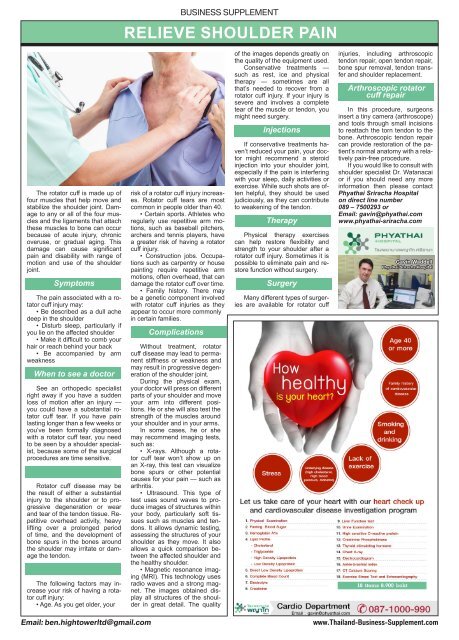PTY BU SUP September18
You also want an ePaper? Increase the reach of your titles
YUMPU automatically turns print PDFs into web optimized ePapers that Google loves.
<strong>BU</strong>SINESS <strong>SUP</strong>PLEMENT<br />
RELIEVE SHOULDER PAIN<br />
The rotator cuff is made up of<br />
four muscles that help move and<br />
stabilize the shoulder joint. Damage<br />
to any or all of the four muscles<br />
and the ligaments that attach<br />
these muscles to bone can occur<br />
because of acute injury, chronic<br />
overuse, or gradual aging. This<br />
damage can cause significant<br />
pain and disability with range of<br />
motion and use of the shoulder<br />
joint.<br />
Symptoms<br />
The pain associated with a rotator<br />
cuff injury may:<br />
• Be described as a dull ache<br />
deep in the shoulder<br />
• Disturb sleep, particularly if<br />
you lie on the affected shoulder<br />
• Make it difficult to comb your<br />
hair or reach behind your back<br />
• Be accompanied by arm<br />
weakness<br />
When to see a doctor<br />
See an orthopedic specialist<br />
right away if you have a sudden<br />
loss of motion after an injury —<br />
you could have a substantial rotator<br />
cuff tear. If you have pain<br />
lasting longer than a few weeks or<br />
you’ve been formally diagnosed<br />
with a rotator cuff tear, you need<br />
to be seen by a shoulder specialist,<br />
because some of the surgical<br />
procedures are time sensitive.<br />
Causes<br />
Rotator cuff disease may be<br />
the result of either a substantial<br />
injury to the shoulder or to progressive<br />
degeneration or wear<br />
and tear of the tendon tissue. Repetitive<br />
overhead activity, heavy<br />
lifting over a prolonged period<br />
of time, and the development of<br />
bone spurs in the bones around<br />
the shoulder may irritate or damage<br />
the tendon.<br />
Risk factors<br />
The following factors may increase<br />
your risk of having a rotator<br />
cuff injury:<br />
• Age. As you get older, your<br />
risk of a rotator cuff injury increases.<br />
Rotator cuff tears are most<br />
common in people older than 40.<br />
• Certain sports. Athletes who<br />
regularly use repetitive arm motions,<br />
such as baseball pitchers,<br />
archers and tennis players, have<br />
a greater risk of having a rotator<br />
cuff injury.<br />
• Construction jobs. Occupations<br />
such as carpentry or house<br />
painting require repetitive arm<br />
motions, often overhead, that can<br />
damage the rotator cuff over time.<br />
• Family history. There may<br />
be a genetic component involved<br />
with rotator cuff injuries as they<br />
appear to occur more commonly<br />
in certain families.<br />
Complications<br />
Without treatment, rotator<br />
cuff disease may lead to permanent<br />
stiffness or weakness and<br />
may result in progressive degeneration<br />
of the shoulder joint.<br />
During the physical exam,<br />
your doctor will press on different<br />
parts of your shoulder and move<br />
your arm into different positions.<br />
He or she will also test the<br />
strength of the muscles around<br />
your shoulder and in your arms.<br />
In some cases, he or she<br />
may recommend imaging tests,<br />
such as:<br />
• X-rays. Although a rotator<br />
cuff tear won’t show up on<br />
an X-ray, this test can visualize<br />
bone spurs or other potential<br />
causes for your pain — such as<br />
arthritis.<br />
• Ultrasound. This type of<br />
test uses sound waves to produce<br />
images of structures within<br />
your body, particularly soft tissues<br />
such as muscles and tendons.<br />
It allows dynamic testing,<br />
assessing the structures of your<br />
shoulder as they move. It also<br />
allows a quick comparison between<br />
the affected shoulder and<br />
the healthy shoulder.<br />
• Magnetic resonance imaging<br />
(MRI). This technology uses<br />
radio waves and a strong magnet.<br />
The images obtained display<br />
all structures of the shoulder<br />
in great detail. The quality<br />
of the images depends greatly on<br />
the quality of the equipment used.<br />
Conservative treatments —<br />
such as rest, ice and physical<br />
therapy — sometimes are all<br />
that’s needed to recover from a<br />
rotator cuff injury. If your injury is<br />
severe and involves a complete<br />
tear of the muscle or tendon, you<br />
might need surgery.<br />
Injections<br />
If conservative treatments haven’t<br />
reduced your pain, your doctor<br />
might recommend a steroid<br />
injection into your shoulder joint,<br />
especially if the pain is interfering<br />
with your sleep, daily activities or<br />
exercise. While such shots are often<br />
helpful, they should be used<br />
judiciously, as they can contribute<br />
to weakening of the tendon.<br />
Therapy<br />
Physical therapy exercises<br />
can help restore flexibility and<br />
strength to your shoulder after a<br />
rotator cuff injury. Sometimes it is<br />
possible to eliminate pain and restore<br />
function without surgery.<br />
Surgery<br />
Many different types of surgeries<br />
are available for rotator cuff<br />
injuries, including arthroscopic<br />
tendon repair, open tendon repair,<br />
bone spur removal, tendon transfer<br />
and shoulder replacement.<br />
Arthroscopic rotator<br />
cuff repair<br />
In this procedure, surgeons<br />
insert a tiny camera (arthroscope)<br />
and tools through small incisions<br />
to reattach the torn tendon to the<br />
bone. Arthroscopic tendon repair<br />
can provide restoration of the patient’s<br />
normal anatomy with a relatively<br />
pain-free procedure.<br />
If you would like to consult with<br />
shoulder specialist Dr. Watanacai<br />
or if you should need any more<br />
information then please contact<br />
Phyathai Sriracha Hospital<br />
on direct line number<br />
089 – 7500293 or<br />
Email: gavin@phyathai.com<br />
www.phyathai-sriracha.com<br />
Gavin Waddell<br />
Phyathai Sriracha Hospital<br />
Email: ben.hightowerltd@gmail.com<br />
www.Thailand-Business-Supplement.com

















